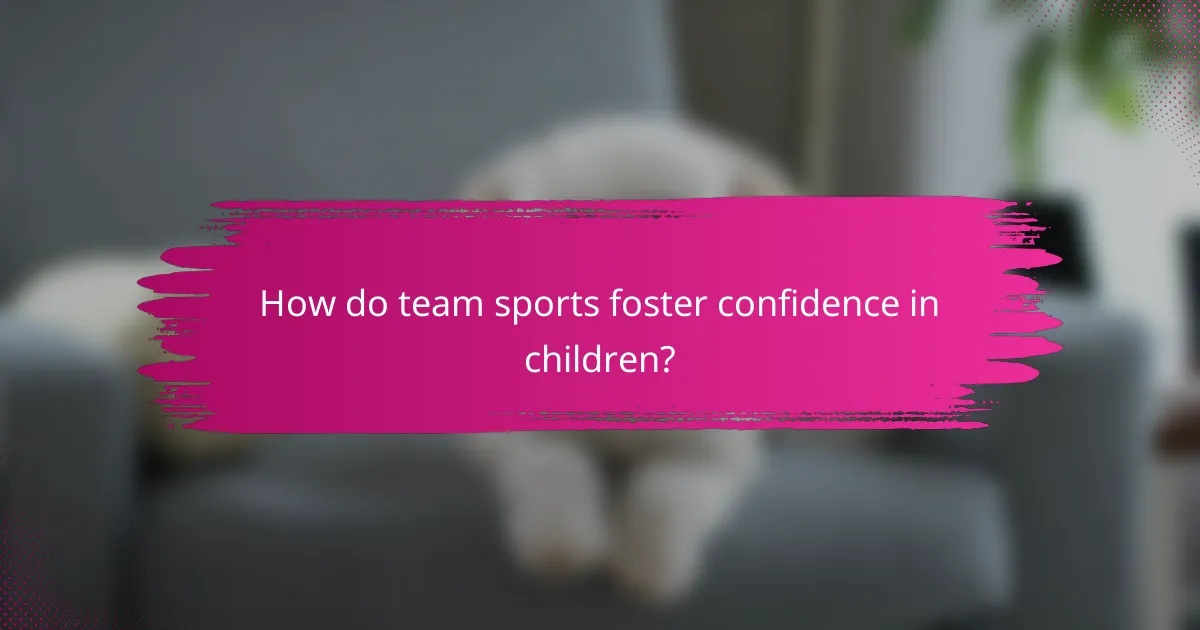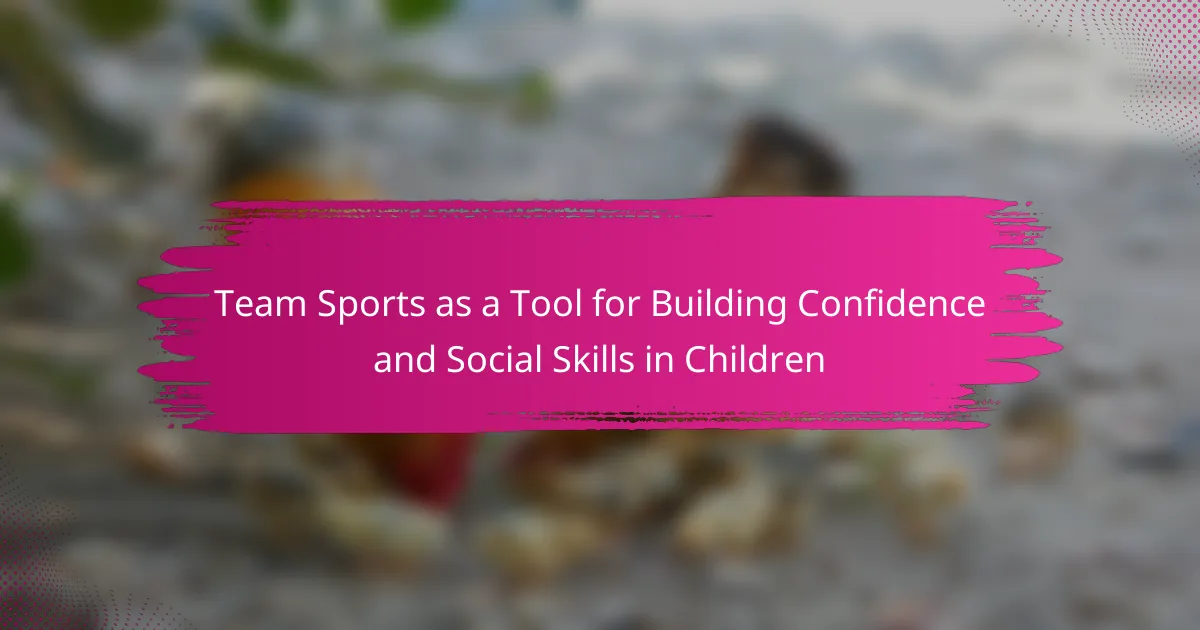Team sports significantly enhance children’s confidence and social skills. They promote teamwork, communication, and resilience. Participation helps children develop problem-solving abilities and emotional strength. Engaging in these activities fosters a sense of belonging and supports personal growth.

How do team sports foster confidence in children?
Team sports significantly foster confidence in children by promoting teamwork and social interaction. Engaging in team sports helps children develop essential skills such as communication, cooperation, and resilience. As they work together towards common goals, children experience a sense of belonging and achievement, which boosts their self-esteem.
Participation in team sports also provides opportunities for children to overcome challenges, enhancing their problem-solving abilities. For instance, learning to handle both victories and defeats builds emotional strength. Moreover, the unique attribute of team sports is the immediate feedback from peers and coaches, which reinforces positive behaviour and personal growth.
Statistics indicate that children involved in team sports are more likely to exhibit higher self-confidence levels compared to those who do not participate in such activities. This correlation emphasizes the role of sports in shaping a child’s social skills and overall confidence.
What psychological benefits do children gain from participating in team sports?
Participating in team sports helps children build confidence and social skills. Engaging in group activities fosters teamwork, communication, and resilience. Children learn to navigate social dynamics, enhancing their ability to form friendships. Additionally, achieving goals in sports boosts self-esteem, contributing to a positive self-image. Research indicates that children involved in team sports exhibit lower levels of anxiety and improved emotional regulation.
How does teamwork contribute to social skill development?
Teamwork in team sports significantly enhances social skill development in children. Engaging in cooperative activities fosters communication, collaboration, and conflict resolution. Children learn to express themselves, listen to others, and build relationships, which are essential social skills. Participation in team sports also boosts confidence, as children experience success and support from peers. This unique attribute of teamwork prepares them for social interactions beyond sports, contributing to their overall development.
What role does communication play in team dynamics?
Communication is essential for effective team dynamics in sports. It fosters collaboration, builds trust, and enhances performance. Clear communication helps children express ideas, resolve conflicts, and develop social skills. These interactions contribute to their confidence and teamwork abilities, essential attributes in both sports and life. Encouraging open dialogue creates a positive environment, allowing young athletes to thrive and learn from each other.
How do children learn conflict resolution through sports?
Children learn conflict resolution through sports by engaging in teamwork and communication. These experiences foster skills like negotiation and empathy. Sports provide real-time scenarios where children must address disagreements, enhancing their ability to resolve conflicts constructively. For example, a child may learn to compromise during a game when faced with differing opinions on strategy. This practical application builds confidence and social skills essential for future interactions.
What unique attributes of team sports enhance self-esteem?
Team sports uniquely enhance self-esteem through teamwork, communication, and shared achievements. These activities foster a sense of belonging, allowing children to build social connections. Participation in team sports provides opportunities for skill development, leading to increased confidence. Additionally, the support from teammates can boost individual morale, creating a positive feedback loop that reinforces self-worth.
How do leadership roles in sports impact children’s confidence?
Leadership roles in sports significantly enhance children’s confidence. By taking on responsibilities, children develop decision-making skills and learn to trust their abilities. This empowerment fosters a sense of belonging and encourages social interaction. Research indicates that children in leadership positions exhibit higher self-esteem and improved communication skills. Team sports provide a unique environment where these attributes can flourish, ultimately shaping confident individuals.
What is the significance of achievement recognition in team sports?
Achievement recognition in team sports significantly boosts children’s confidence and social skills. It fosters a sense of belonging, encourages teamwork, and enhances self-esteem. When children receive recognition, they feel valued, which motivates them to participate actively. This positive reinforcement helps them develop essential social skills like communication and collaboration. Furthermore, recognition can create a supportive environment where children learn to celebrate each other’s successes, strengthening team bonds. Overall, achievement recognition plays a crucial role in personal and social development within team sports.
What rare opportunities do team sports provide for social interaction?
Team sports provide unique opportunities for social interaction, fostering friendships and teamwork. Children learn to communicate effectively, resolve conflicts, and develop empathy. This rare attribute of team sports enhances social skills by creating a sense of belonging and shared goals. Engaging in these activities often leads to lasting relationships that extend beyond the playing field.
How do diverse team environments influence social skills?
Diverse team environments enhance social skills by promoting collaboration and communication. Engaging in team sports exposes children to various perspectives, fostering empathy and adaptability. These interactions build confidence, as children learn to navigate different social dynamics. Ultimately, participation in diverse teams equips children with essential interpersonal skills for future success.
What unique challenges do children face in team sports that build resilience?
Children face unique challenges in team sports that foster resilience, such as learning to cope with failure, managing competition, and developing teamwork skills. These experiences teach them how to handle setbacks, communicate effectively, and support peers. For instance, losing a game can instil a sense of perseverance, while sharing successes promotes collaboration. Additionally, navigating diverse personalities within a team enhances their social skills and emotional intelligence. These challenges are vital for building confidence and adaptability, essential traits for personal growth.

What are the universal attributes of team sports that benefit children?
Team sports universally benefit children by enhancing their confidence and social skills. Participation fosters teamwork, communication, and resilience. Children learn to collaborate, resolve conflicts, and support peers, which builds self-esteem. These attributes are essential for personal and social development. Engaging in team sports also provides a sense of belonging and promotes healthy relationships.
How does regular physical activity in team sports improve overall well-being?
Regular physical activity in team sports significantly enhances overall well-being by fostering social interaction and building confidence. Participation in team sports encourages children to communicate, collaborate, and develop friendships, which are essential for emotional health.
Engaging in sports also promotes physical fitness, which is linked to improved mood and reduced anxiety. Research shows that children involved in team sports exhibit higher self-esteem and better social skills compared to those who do not participate.
Moreover, the unique attribute of team sports is the sense of belonging they provide, which can lead to long-lasting relationships and a supportive community. As a result, children learn valuable life skills like teamwork, leadership, and resilience.
What common team sports are most effective for building confidence?
Team sports that effectively build confidence include football, basketball, and volleyball. These sports promote teamwork, communication, and resilience. Participating in these activities helps children develop social skills, leading to increased self-esteem. Additionally, the unique attribute of competitive play encourages children to face challenges, enhancing their confidence in various situations.

How can parents encourage their children to participate in team sports?
Encouraging children to participate in team sports fosters their confidence and social skills. Parents can model enthusiasm for activities, ensuring children feel supported.
1. Create a positive environment by celebrating effort and teamwork.
2. Encourage exploration of different sports to find what interests them.
3. Arrange playdates with peers involved in sports to build connections.
4. Attend games and practices to show commitment and interest.
5. Emphasize the fun aspect of sports over competition to reduce pressure.
What strategies can parents use to support their child’s involvement in sports?
Parents can support their child’s involvement in sports by encouraging participation, fostering a positive attitude, and emphasizing teamwork. Engaging in regular discussions about their experiences can build confidence.
Setting realistic goals helps children track their progress, enhancing motivation. Providing logistical support, such as transportation to practices and games, demonstrates commitment.
Promoting social interactions with teammates can strengthen friendships and improve social skills. Celebrating achievements, regardless of outcome, reinforces a growth mindset.
Encouraging resilience in facing challenges develops perseverance, a valuable life skill. By modeling enthusiasm for sports, parents can inspire their children to embrace physical activity and teamwork.
What are common mistakes to avoid when introducing children to team sports?
Introducing children to team sports can enhance their confidence and social skills, but certain mistakes can hinder this development. Common mistakes include overemphasizing competition, which may create pressure rather than enjoyment. Neglecting to consider children’s interests can lead to disengagement. Additionally, failing to foster a supportive environment can discourage participation. Lastly, not prioritising skill development over winning can stifle growth and confidence. Avoiding these pitfalls ensures a positive experience that promotes essential life skills.

What expert insights can enhance the impact of team sports on children?
Team sports significantly enhance children’s confidence and social skills through structured teamwork and competition. Engaging in these activities teaches children to communicate effectively, resolve conflicts, and develop leadership qualities. Research indicates that children involved in team sports exhibit higher self-esteem and improved social interactions, laying a foundation for lifelong skills. Additionally, participation fosters a sense of belonging, as children learn to work towards common goals and support one another, which is crucial for their emotional development.
What best practices should coaches follow to maximize confidence-building?
Coaches should create a supportive environment, set achievable goals, and provide constructive feedback to maximize confidence-building. Encouraging teamwork fosters social skills and resilience. Regularly celebrating small successes enhances motivation and self-esteem. Active listening builds trust and reinforces positive relationships among team members.


